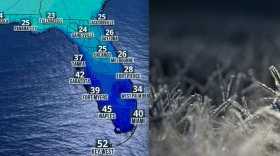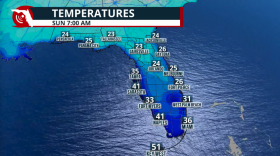-
Watches will likely become warnings as early as Friday, as extremely cold temperatures are expected to affect the state on Saturday and Sunday.
-
This will not be the coldest air mass of the season, but it could be the coldest air mass felt in over a decade for some. Some flurries are also possible.
-
Rising temperatures, increasing nutrients, and changing currents could all be factors in the algae expansion.
-
Cold weather advisories are in effect statewide, while the most extreme cold takes over the Panhandle.
-
The local Arbor Day observance coincides with the best time in Florida to plant trees.
-
Most of the storm activity will be done by late evening. Then a cold air mass will sink in place. Freeze and cold alerts are in effect.
-
The extensive storm brewing over the Rockies and Plains will impact millions over the weekend. Florida will be spared from winter precipitation, but not from the cold.
-
The Wildlife, Heritage, & Outdoors Festival happens this weekend in Wakulla County. It's hosted by the Friends of St. Marks Wildlife Refuge.
-
There's a chance for snow across the western part of the Panhandle as well as mixed precipitation along I-10. Little impact is expected as temperatures will quickly rise.
-
A fridgid air mass takes over Florida to end the week, but there is more cold weather in the horizon.
Play Live Radio
Next Up:
0:00
0:00
Available On Air Stations










